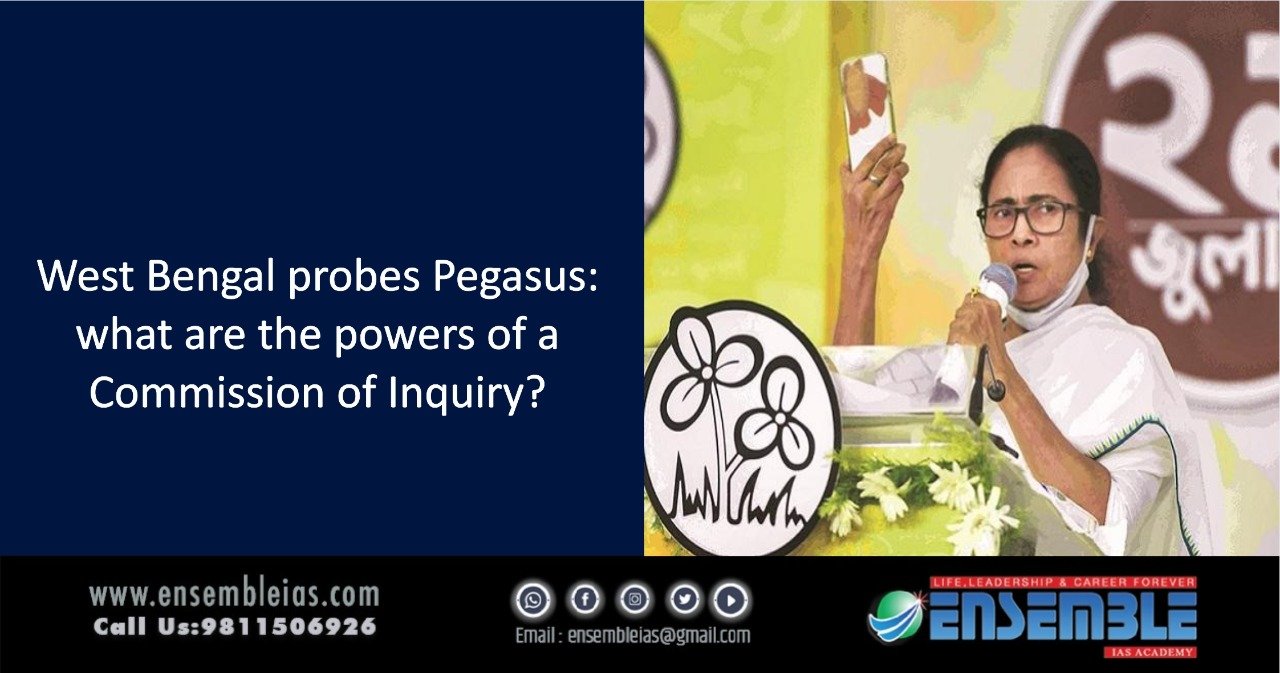Project Pegasus: The West Bengal government’s move appointing a committee first could force the Centre to react on the issue.
To buy our online courses: Click Here
The West Bengal government has set up a Commission of Inquiry into the alleged surveillance of phones using the Pegasus spyware developed by the Israeli cyber-intelligence company NSO Group. The Commission, comprising former Supreme Court Justice Madan B Lokur and former Calcutta High Court Justice Jyotirmay Bhattacharya, will look into the alleged breach of privacy of several individuals —journalists, activists, businesspersons, police officials, politicians — both in the government and the opposition.
What is its mandate?
According to the notification issued by the West Bengal government, the Commission will “enquire into and report on inter alia the reported Interception and the possession, storage and use of such information collected through such Interception, in the hands of State actors and non-State actors.”
The notification said reports that are part of a global investigation by 17 media organisations drawing on data accessed by Paris-based Forbidden Stories are a “definite matter of public importance”.
What are its powers?
Under The Commissions of Inquiry Act, 1952, a Commission set up by the government shall have the powers of a civil court, while trying a suit under the Code of Civil Procedure, 1908. This means that the Commission has powers to summon and enforce the attendance of any person from any part of India and examine her on oath, and receive evidence, and it can order requisition of any public record or copy from any court or office.
Under Section 5 of the Act, the Commission also has the power to require any person, subject to any privilege which may be claimed by that person under any law for the time being in force, to furnish information on such points or matters that, in the opinion of the Commission, may be useful for, or relevant to, the subject matter of the inquiry.
Why has a state government set up the Commission?
While both central and state governments can set up such Commissions of Inquiry, states are restricted by subject matters that they are empowered to legislate upon.
However, it matters who orders an inquiry first. Not just politically, but also under the law.
If the central government set up the commission first, then states cannot set up a parallel commission on the same subject matter without the approval of the Centre. But if a state has appointed a Commission, then the Centre can appoint another on the same subject if it is of the opinion that the scope of the inquiry should be extended to two or more states.
The West Bengal government’s move appointing a committee first could force the Centre to react on the issue.
In the past, there have been political tussles between a state and the Centre leading to setting up of different Commissions of Inquiry on the same subject matter. In 2002, when Narendra Modi was Gujarat Chief Minister, the state government has set up a Commission of retired Justices G T Nanavati and A H Mehta to probe the Godhra train burning and the subsequent riots. The Commission later gave a clean chit to the state government in its report.
In 2004, Lalu Prasad Yadav, then Union Railways Minister in the Congress-led UPA government, constituted a Commission of Inquiry on the same subject, under former Supreme Court judge U C Banerjee. The Banerjee Commission reported findings contrary to that of the state commission.
However, the Gujarat High Court later held that the constitution of the Banerjee Commission was illegal, and quashed its conclusions since the state-appointed Commission was already looking into the issue.
What kind of subjects can a Commission probe?
Under Section 2(a) of the 1952 Act, Commissions set up by the central government can make an inquiry into any matter relatable to any of the entries in List I (Union List) or List II (State List) or List III (Concurrent List) in the Seventh Schedule to the Constitution, while Commissions set up by state governments can look into entries in List II or List III.
In the Pegasus inquiry commission, the West Bengal government has cited public order and police entries. While these subjects are in the State List, an argument could also be made that the subject matter of the inquiry essentially falls under the Central List.
Entry 31 of the Union List or List I deals with posts and telegraphs, telephones, wireless, broadcasting and other like forms of communication.
Also Read:संसाधनों पर बोझ बनती बढ़ती आबादी
The findings of such commissions are normally tabled in the Assembly or Parliament, depending on who constituted it. The West Bengal government has tasked the Lokur Commission to submit a report within six months. However, the government is not bound to make the report public. The findings are not binding on the executive wither, but can be relied upon by courts as evidence.




